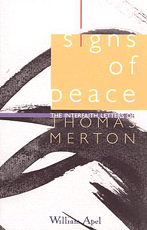"Like Merton, we have attempted in this volume to offer 'a small message of hope.' There are always the practical dreamers, in this case men and women of various faiths who stand ready to be spiritual pioneers, thinking and acting as signs of peace. In October 1968, not long before his death, Merton delivered an informal talk in Calcutta sponsored by the Temple of Understanding (an interfaith organization) in which he once again called forth those willing to communicate God's message 'on the deepest level.'
"What is this message of God? We have heard it again and again in the correspondence of Merton and his interfaith friends. This message never seems to change or waver. It is a message that our pioneers of faith could not walk away from. It can be found in their writings and in the lives they lived. The message is not all that complicated, once seen and experienced. It is so simple, so profoundly true. And it cannot be ignored. It is the message of God's love.
"Merton and his interfaith friends speak of nothing else but this message. The message is shared from one person to another. It is personal, and it defies institutionalization. Some might be tempted to make it into a slogan. It might even end up as an aphorism printed on a refrigerator magnet. But ultimately it cannot be abased or trivialized, for it is from God. Although it always rings true, its communication must be carefully cultivated. In fact, this message of love often does not come to us through 'normal' channels.
"Those who know it best and experience its truth communicate it in a different way — a way our interfaith friends have discovered (or rediscovered). Merton constantly reminded us of this way. It is not a new way at all, but it is a way that has largely been forgotten. It is, in fact, the way of deepest communication. Merton, as only Merton can, identifies this way in a most provocative manner:
" 'The deepest level of communication is not communication, but communion. It is wordless. It is beyond words, and it is beyond speech, and it is beyond concept. Not that we discover a new unity. We discover an older unity. My dear brothers, we are already one. But we imagine that we are not. And what we have to recover is our original unity. What we have to be is what we are.'
"This is God's most essential message to us. We are already one. We are united in love. Merton and his interfaith friends knew this to be true in the very marrow of their spiritual bones. Bigotry and injustice have no place in this new (but original) way. War and violence are incompatible with God's truth. How could any of this fit God's reality (God's kingdom)? To harm another is to harm ourselves. We visit only death upon ourselves by our divisiveness. We are already one. This is the truth of God for our times — for any time.
"And so God's litany of our original unity is sung (and also danced) by God's witnesses. What Merton and his interfaith friends experienced, in the end, is not new at all. We are already one. Period. 'But,' as Merton observed, 'we imagine we are not.' That is the tragedy of our day.
"Yet, the world is gradually awakening. We are beginning to look differently at ourselves and others. With God's help there is the real possibility that we, at least some of us, are becoming signs of peace for our broken and violent world, a world so desperately in need of love. This is the 'small message of hope' that Merton and his interfaith friends had begun to realize a half-century ago. The course is set before us. God's message is always before us and in our hands. According to Merton, 'What we have to be is what we are.' Signs of God's peace."
